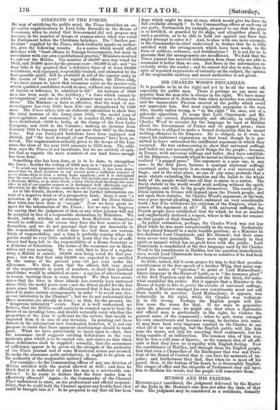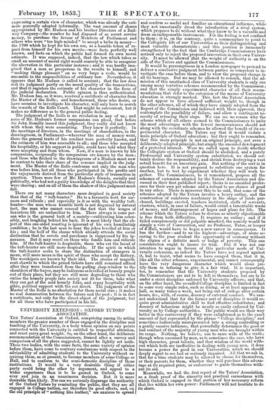HUDSON AND HIS FRIENDS.
Hisroarc.kur considered, the ja.: '.ent delivered by the Master of the Rolls in Mr. Hudson's case .oes not alter the state of that case. The judgment may be considered as a certificate, formally expressing a certain view of character' which was already the esti- mate generally adopted informally. The vast amount of shares appropriated by Mr. Hudson and his brother Directors of a Rail- way Companyâthe number he had disposed of as secret service money, to purchase the favour of Members of Parliament and others who were "too high-minded" to accept a bribe in moneyâ the 1700 which he kept for his own use, as a humble token of re- gard from himself for his own meritsâwere facts perfectly well known, and facts on which the public had formed its own moral estimate. It was supposed, indeed, that the law which takes so small an account of moral right would scarcely be able to recognize the aberration in this particular instance ; and it was hardly ima- gined that a man so prosperous in the results to himself, and -"making things pleasant" on so very large a scale, would be amenable to the responsibilities of ordinary law. Nevertheless, it appears that Mr. Hudson is called to account; that the law does rest its judgment partly on the moral quality of the transactions, and theta registers the estimate of his character in the form of the judicial declaration. Public opinion is thus authenticated. Mr. Hudson has, as it were, received a certificate of character from the Master of the Rolls ; and henceforward, those who desire, or have occasion to investigate his character, will only have to search the reaords of the Rolls Court. That might be convenient, but it makes no difference as to the general public feeling. The judgment of the Rolls is no revelation to any of us ; and none of Mr. Hudson's former companions can plead, that before Sir John Romilly issued this judgment, they really did not know with whom they were associating. They knew it perfectly. In the meetings of directors, in the meetings of shareholders, in the drawingroom, in Parliamentâwherever the man of money went, there the general traits of his conduct were perfectly known, and the estimate of him was accessible to all; and those who accepted his hospitality, or his support in public, could have told what they were accepting and from whom. Now, if a man is known by his companions reciprocally the companions are known by the man ; and those who flocked to the drawmgroom of a Hudson must now be content to take their share of the censure implied in the judg- ment. The Master of the Rolls condemns not only the man.who was before him, but all those who participated in the profits and the enjoyments derived from the particular style of transaction in question. There were few of Mr. Hudson's friends, socially and politically, who had not a guilty knowledge of the delights that they were sharing; and on all of them the shadow of this judgment must fall.
There are not many characters more despised in good society than that of the "tuft-hunter." He is a favourite butt for sar- casm and ridicule ; and especially is it so with the wealthy tuft- hunterâthe man whose humble birthis not disguised by natural tact, the man who cannot conceal the fact that the usages of luxurious life are unfamiliar to him. There always is some per- son who is the general butt of a societyâcultivating him osten- sibly, and laughing behind his back. It is most likely that the ob- ject of this one-sided roasting is ignorant of his own humiliatiuk condition ; he is the last man to hear the jokes levelled at him or his ; and the half of the shame which already attends the social distinction that he covets and purchases is suppressed by his ig- norance. But it may recoil on those who fondle him and ridicule him. If the tuft-hunter is despicable, those who eat the bread of the tuft-hunter are still more despicable. If the spirit in which the tuft-hunter seeks to share the distinction of strangers is mean, still more mean is the spirit of those who accept the flattery. The worshipers are known by their idol. The stories of magnifi- cent shawls to which the priced tickets have still remained affixed after they were transferred from the puffing shop-window to the shoulders of the buyer' maybe ludicrous as levelled at homely people out of their place, but they are still more degradina.° to those who entice the homely people into society not fit for them, take what they can get of the said homely folks, and repay hospitality with gibes, political support with the cut direct. The judgment of the Master of the Rolls is no absolution for these social sins ; it makes no real demarcation between the future and the past ; it is in fact a certificate, not only for the direct object of the judgment, but for all those who have participated in his life.



























 Previous page
Previous page